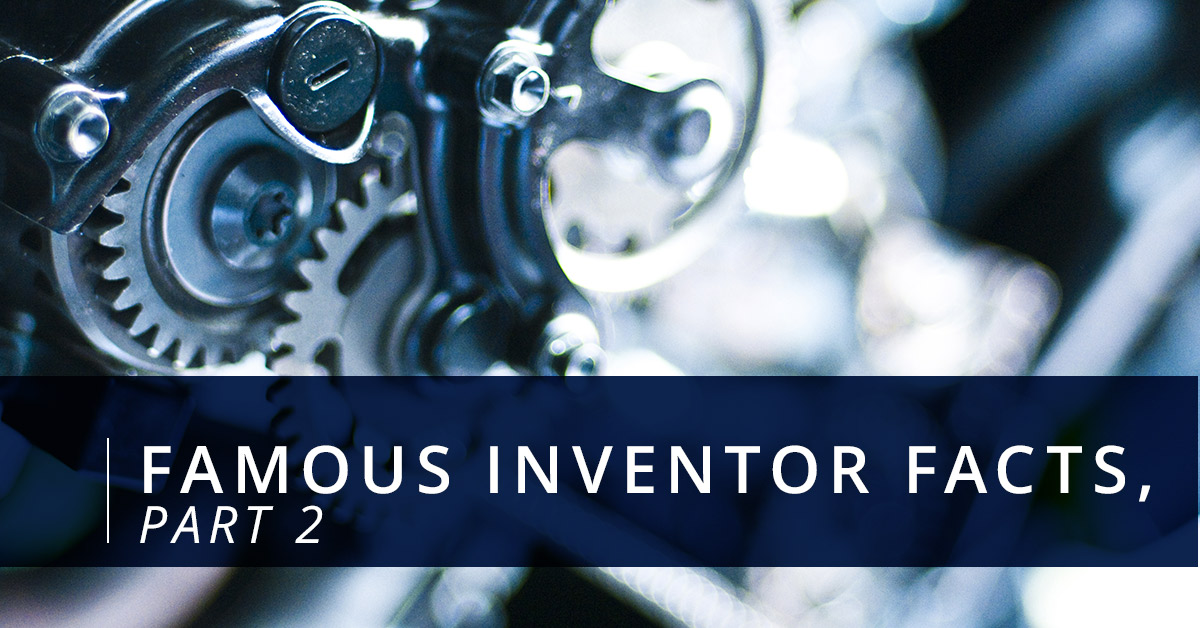
Here at Flex Technologies, we sell flexible silicone hoses and tubes online to keep a wide variety of businesses running on a day to day basis. These industries include marine, auto, medical, agriculture, medical, aerospace, and more. Each of these industries relies heavily on machinery in one way or another. To celebrate all of the people that have created machines that make our lives easier, we'd like to continue our Famous Inventor Facts here.
Apology not accepted
Not all inventions make the world a better place. Ethan Zuckerman, unfortunately, found that out the hard way. He was the inventor of pop up ads. Before you get too filled with rage, Ethan Zuckerman apologized in the Atlantic, saying that his creation of the most hated form of advertising in the world was unintentional. Unfortunately, it may take a while to put Pandora back in her box, so pop up ads won't be going anywhere anytime soon.
Eye see you
We mentioned Benjamin Franklin in our last entry, about how he never patented any of his inventions because he altruistically believed they should be used for the benefit of his fellow man. What makes this so unique is that Franklin was a prolific inventor. He could have made serious money from his inventions, the most notable of which may be the bifocals. He is also credited with inventing the Franklin stove, the lightning rod, and the glass harmonica. Regarding the glass harmonica, it became so popular in Europe that both Mozart and Beethoven composed some music especially for it.
The thanks I get
Inventing isn't easy; it is thankless, rarely rewarded work that often brings joy to others but pain to the inventor. Maybe no example of this is more obvious than William Bullock, who invented the web rotary press. Unfortunately, Mr. Bullock would end up getting killed by the very invention he created. That must have felt like a betrayal.
You are what you invent
As you can imagine, inventors often have a close relationship with their inventions. For a great example of this, look to one of the most notable inventors (not the original) of the Frisbee, Edward "Steady Ed" Headrick. He was responsible for taking it from a fad into an actual piece of sporting equipment, designing all kinds of improvements to the product. What is interesting is that, after he died, he had his cremated ashes put into a batch of Frisbee. In his son's words, "He said he wanted to end up in a Frisbee that accidentally lands on someone's roof", on top of raising money to create a disc golf museum. He got his wish, and Steady Ed Frisbee discs are now valuable collectors items, with a set of two going for about $200 on Amazon.
Dangerous work
Many famous inventors have suffered major losses for their work. One of these includes the famous Alfred Nobel, who tragically lost his brother after an accident in their lab while working with liquid nitrogen. They were trying to create a less volatile explosive. Mr. Nobel would not let his brother's sacrifice happen in vain, and he completed his research, inventing dynamite in the process.
Quirks
Nikola Tesla just might be the greatest inventor who ever lived, but is at least up there in the ranks of Benjamin Franklin, Leonardo Da Vinci, etc. However, he was also maybe the quirkiest inventor. A virgin his entire life, he had many antisocial personality traits. One humorous one was his aversion to pearls. And not a minor aversion, either, he actually refused to speak with any women who wore them. Sorry ladies, it is a small price to pay for alternating current, Tesla coils, and his many other wonderful inventions.
Unpatentable
Not every failure to become successful from an invention is due to other people coopting work. Sometimes the cards are just stacked against you. That was the case for Charles Martin Hall, inventor of the modern waterbed. Before Hall's invention, water beds were only used for medical purposes, and were essentially death traps due them constantly bursting open. But these previous models weren't what stopped Hall from getting a patent on his invention. That was due to a science fiction novel that had already used the concept, making it public domain. Sorry Hall, but thanks for making the 70s just a little bit groovier!
The hardest part of inventing
The hardest part of inventing is, well, inventing. But, once you are all done with a finished product, finding the perfect marketable name for it can be daunting as well. Many famous new inventions were renamed for marketability. One notable example is Popsicles, which were originally going to be called "Eppsicles" in honor of the man who invented them, Frank Epperson. However, his children changed their name to Popsicles to appeal to a wider audience, and the rest is history.
Just need some incentive
Considering how important incentives are to production and ingenuity, it is surprising we don't protect our inventors more. For an example of how incentives works, we need only look at Napoleon Bonaparte. In the 1790s, Napoleon's army was losing more men to malnutrition than in combat. At that point, Napoleon famously noted that "an army marches on its stomach", and promptly offered a 12,000 franc prize through the French Revolutionary government to anyone who could create a way to make food both less perishable and more portable. A Parisian confectioner, Nicolas Appert, spent the next 15 years perfecting a technique of preservation through sealing food in bottles, then immersing those bottles in boiling water. The boiling water killed the bacteria causing the food to rot, and the seal prevented any new bacteria from getting in. Appert would then send bottles filled with a range of foods, including meat and vegetables, to soldiers stationed at sea. They reportedly all found fresh food inside, and Napoleon awarded Appert his prize personally.
Unnecessary, but cool
Not all inventions are for making the world a better place, necessarily; sometimes they're just outrageous. And sometimes, people love the outrageousness. That must have been the case with the invention of cars with flamethrowers, by Charl Fourie in South Africa. This wildly superfluous and unnecessary invention actually won the Nobel prize in 1999. It just goes to show you, people really love pimping out their cars.
Small Regrets
When you are inventing something on a huge scope, there are bound to be small regrets. That was the case with Tim Berners-Lee, who invented the software standards that make up the internet's bedrock. When asked if there was anything he would do differently, he mentioned that he regretted the double slash ("//") after the "http:" that appears in web addresses. While it was a convention in programming at the time, he said that it ended up being totally useless and superfluous.
A Grand Entrance
The inventor of the roller skates needed a great way to unveil his new invention. So, John Merlin, said inventor, came up with quite the grand entrance. At the Carlisle-House in London, during a masquerade party, he decided to demonstrate his skates personally, while also playing a violin. Unfortunately, he was not the best skater in the world, and promptly crashed into a huge mirror. That is one way to unfurl a product!
We hope you found these fun facts interesting! If you need flexible silicone hoses or tubes online, check our extensive high quality selection. For more information, please do not hesitate to give us a call at your earliest convenience.
 Default Currency
Default Currency
 Mexican Pesos
Mexican Pesos
 Canadian Dollar
Canadian Dollar


